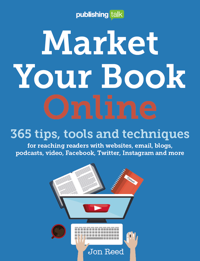10 ways to market your book if you really don’t like marketing
You know that you need to market your book. But what if you really, really, don’t like marketing? You became a writer to write, after all – not to sell.
[rt_reading_time label="Reading Time:" postfix="minutes" postfix_singular="minute"]
Do you feel that writing is what you’re good at – and marketing isn’t? It’s true that writing is your primary task. It’s natural to want to play to your strengths and focus on what you love doing – without the inconvenience of having to having to find an audience for it. But it’s also true that you won’t last long as a writer without a readership.
Yes, you’re more likely to have some success with a book that you don’t market than with lots of marketing but without a product. Though don’t underestimate the value of audience-building before you have a book. But if you want your work read, people need to know about it – and about you. You’ll also have more success the more books you write. “If you liked X you may also like Y” only works when there is a Y to promote, after all – and preferably a Z too.
Here are some painless ways to approach marketing if you really don’t like marketing.
1. Write a really good book
It may sound trite, but there really is no substitute for quality. The holy grail of marketing is always word-of-mouth recommendation from other readers. While there are many ways you can use online marketing to facilitate and boost this, it won’t work with a bad book. Write a remarkable book and you stand a better chance. A book that other people will want to talk about, and recommend to their friends.
Write a good book, and other people will market your book for you. A recommendation from a friend – or an online ‘influencer’ – always carries more weight than the author saying ‘please read my book’. You have a vested interest in people reading your book. Other readers don’t.
2. Develop a positive attitude
If you want to build a career as a full-time author, rather than keep it as an evenings-and-weekends hobby, your writing must pay. And to make it pay your work must be marketed to a paying public. Furthermore, you’re likely to have to get involved in promoting it yourself. But it might not be as bad as you think. You might even enjoy it.
If you’re positive about your book, and excited by it, other people will pick up on it. Are you thrilled to receive a box of advance copies from your publisher? Of course you are! Say so, with a photo or video of you opening the box on Instagram. Did you enjoy spending the last year or so with the characters in your novel? It’s OK to say so, and that you’re excited for other people to meet them. Have you finally written a memoir about a difficult issue that might help a reader with a similar problem? Share what the book means to you – and what you hope others will get out of it.
Some authors have a negative, resentful attitude to marketing. They think it’s their publisher’s job. They’re a writer, and shouldn’t have to get involved with their own marketing. Resentful writers don’t sell books. Positive authors do.
3. Get your publisher to market your book for you
Are you traditionally published? You might be able to get your publisher to market your book for you. Well, maybe. The truth is that few titles get selected for publicity. If you’re a famous, bestselling author, you can expect your publisher to do much of the work for you. If you’re not, they simply won’t have the budget.
You might have a successful book without doing much marketing yourself – if you’re traditionally published and one of the lucky few authors who has the weight of a big corporate publicity department behind them. This scenario is rare. I know from my long experience of working in publishing that those ‘publicity titles’ are a drop in the ocean of the output of most publishers. A few books will be selected – the rest will get the bare minimum.
And even if you’re one of those lucky few, you’ll still have to do some work yourself to market your book, such as media interviews, articles for the press, literary festivals – and generally be available to meet all those publicity demands your publisher generates. Some authors enjoy that side of things, others don’t. Some even complain about it on social media – and get told off by those authors who can only dream of such success.
But you should expect some marketing effort from your publisher, if you’re traditionally published. Discuss this with them early, and involve your agent in those conversations and meetings, if you have one. It’s reasonable to ask in advance what your publisher will be doing for you and your book.
4. Hire someone else to market your book for you
If you’re self-published, you have to market your book yourself, of course. Or do you? The alternative is to hire someone to do it for you. So, if you’re in the happy position of being able to afford some freelance help, then outsource the job you don’t like / aren’t good at (marketing) so you can free up more of your time to concentrate on your core objective (writing). This is something many businesses do. And it’s often more affordable than you think.
If your books are selling well enough, let your success build on itself by outsourcing the marketing (which should boost sales) so you can write more books (and have more to sell). This entrepreneurial spirit is often to be found among self-published writers. Find people to help you with marketing using online directories such as Reedsy or Upwork.
5. Don’t market – build relationships
Don’t think of it as marketing. Some people are put of by squeamishness at all those ‘please buy my book’ messages on social media. If you’re one of them: good! I totally agree with you. There’s nothing worse than spammy, salesy ‘buy now!’ updates cluttering up your timelines. Online marketing should be about sharing useful, interesting, thought-provoking or funny content. Sales are important, but secondary in the process.
And when you do talk about your book, think of it as storytelling rather than marketing. Like all good stories, the story you’re telling has a beginning, middle and end: what motivated you to write your book, what you discovered along the way – and what you hope others will gain from reading it.
6. Don’t be afraid to share your successes
Don’t be too squeamish, though. Some authors are so shy about online marketing that they practically keep the fact that they’ve written a book a secret. This is rather pointless, and unnecessary. You are allowed to mention the fact that you are an author, and have written a book! If you’re already on, say, Twitter, and are already published, then a proportion of your followers will inevitably be your readers and fans. They’re following you because they’ve read your books. They also want to hear when your next book is coming out – and you’re doing them a disservice if you don’t let them know.
I would go so far as to say that coyness about your book, or your success in any field, is almost rude. No one achieves things alone – and if you don’t announce your book, or celebrate your success, it’s rude to the other people involved. These people may include your publisher, the hosts of a literary festival you’re speaking at, or the organizers and sponsors of a prize you’ve won. It also denies your friends, followers and readers, who want to hear your news. Share it with the world!
Your success doesn’t have to be winning the Booker Prize, though. You don’t even need to have had your book published yet. Share small wins from the writing process. As well as sharing details from your life with your followers, you’ll be helping to build anticipation for your forthcoming book.
7. Don’t feel you have to do everything
You don’t need to use every online marketing tool out there. Get an overview of what tools and platforms are available – then decide what works for you, what you have the time for and what you enjoy doing. You can research something new whenever you feel you’re ready to try a different approach, need inspiration, or if you feel you’re not getting the results you want. But start small, and gradually increase your tools, platforms and activity as you feel necessary. See what works – and do more of that.
8. Share other people’s books too
Are you worried about posting about your own books all the time? Why not post other people’s books too? Authors are also readers – and sharing what you’re reading is a great way to connect with other readers online. Many authors I know regularly post about the books they’re reading or have just read, often with a short review. Sometimes they’re sent advance copies to review, and they post about them too, saying they ‘can’t wait until this comes out!’
This all helps position you as someone who loves books, and connect with other people who love books. Sometimes your posts will be about your own books – and that’s fine too. It also helps create a what-goes-around-comes-around literary karma: if you’ve previously promoted an author’s work (don’t forget to tag them!), that author may then follow you, notice when you have a book out, and return the favour. If they like your book. But don’t expect this, or just promote other people’s books in the hope that they’ll do the same for you. Be authentic. Keep it real.
9. Focus on the topic rather than the book
This works particularly well if you write non-fiction. For example, Mel Robbins is a life-coach and motivational speaker who writes bestselling books. Her Twitter and Instagram feeds are full of inspirational quotations and practical advice. Jonathan Hoban is a pioneer of ‘walking therapy’ – and author of Walk With Your Wolf: Unlock your intuition, confidence & power with walking therapy. His Instagram feed is full of videos of him walking and talking and offering advice.
This doesn’t just apply to therapy, of course. It works for any niche topic, from carpentry to flower arranging to parenting. It can even be a way to get a book deal. Ana White is the author of The Handbuilt Home: 34 Simple Stylish and Budget-Friendly Woodworking Projects for Every Room. She got a book deal off the back of her blog, where she gave away lots of free woodworking plans.
You can also do this if you write fiction. The topic may not be as immediately obvious – but you can always share writing tips (#WriteTip) and advice for other would-be authors. Write romantic fiction set in Cornwall? Share images of Cornwall that inspire your writing. It works for author Liz Fenwick, who regularly shares photos – and videos – 0f her ‘plot walks’, with the hashtag #PlotWalk.
People come for the advice, inspiration and information – and go on to buy the book. Or they buy the book and then follow the author on social media – and get a recommendation for the next book! Either way, it’s a topic-based feedback loop. But you can make your focus the topic rather than the book. Just be sure to include a link in your bio to where people can find your book – and mention your book occasionally.
10. Have fun
You don’t have to be a marketing guru. Just be yourself. You can be playful, irreverent, authentic and human on social media. Talk about what you’re reading, watching on TV, or having for lunch. Share pictures of your dog (people love dogs), or photos of you having fun with friends and family. Talk about what you like and what you do. One of the things you do is write books – so why wouldn’t you mention that?
 Market Your Book Online
Market Your Book Online
This post is an extract from my forthcoming book Market Your Book Online: 365 tips, tools and techniques for reaching readers with websites, email, blogs, podcasts, video, Facebook, Instagram, Twitter and more. Available for pre-order soon. Sign up to the newsletter to hear more.


 Market Your Book Online
Market Your Book Online